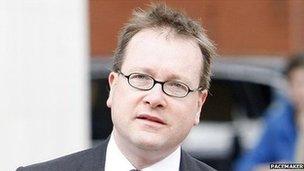Richard Haass talks: Latest phase ends until December
- Published
Richard Haass is due to return to Northern Ireland again next month
The latest phase of talks chaired by the former US envoy Richard Haass have finished in Belfast.
Dr Haass met representatives from the five executive parties as part of his attempt to find a consensus on parades, flags and dealing with the past.
The discussions on Friday centred on the talks process and was described by one participant as the "pre-negotiations stage".
Dr Haass and his team will return in December for intensive talks.
The US diplomat described the latest round of talks with the political parties as "serious, thoughtful and creative".
He said he still believed they could find a consensus before the end of the year.
Dr Haass also said he had been struck by the intensity of the reaction by victims he had met.
'Human situation'
"Speaking if you will, personally rather than professionally, it is impossible to come away from these meetings with victim and survivor groups and not be affected," he said.
"This is a political situation, sure, but it's also a human situation."
After the meeting, the DUP MP Jeffery Donaldson said a deal was possible "and would not be for the want of effort".
Sinn Féin's Gerry Kelly said a deal could be achieved by Christmas.
He told reporters: "My best guess is we can do it."

Dr Haass also held discussions with Attorney General John Larkin
Ulster Unionist Party MLA Tom Elliott described the talks as the "calm before the storm", while the Alliance MP Naomi Long said "a deal was not impossible but required commitment".
SDLP MLA Alex Attwood said: "People are now in the best place in 15 years to deal with unfinished business."
Dr Haass also held discussions with Attorney General John Larkin.
Earlier this week, Mr Larkin suggested there should be an end to all prosecutions, inquiries and inquests for Troubles-related killings.
Friday's talks were the third round of discussions between Dr Haass and the five Northern Ireland executive parties.
Submissions
This week, Dr Haass also met the Bloody Sunday relatives and other groups in Londonderry, while his team held talks with the Orange Order and nationalist residents in Portadown, County Armagh, and Belfast.
Some details of his discussions became public, with Sinn Féin choosing to reveal its written submissions.
DUP leader Peter Robinson said publishing the Stormont parties' submissions to the Haass negotiations narrows the room for manoeuvre in the talks.
"I certainly, as a party leader, didn't feel it appropriate for us to put out our documentation given the specific role that we had," he said.
"It's up to every party as to what they do, I don't think it does any particular violence to the process, I just think that if people publicly stating their position narrows their room for manoeuvre, maybe that's what they were trying to do."
Dr Haass began chairing the talks in September. He served as US envoy to Northern Ireland from 2001 to 2003. He was chosen to chair the discussions by the first and deputy first ministers.
So far, Dr Haass and his team have held 100 meetings, met 500 individuals and received 600 submissions.
This week he held more than 25 hours of meetings and met the five Executive parties twice.
He is due back in Northern Ireland on 9 December for more talks.
- Published22 November 2013
- Published18 November 2013
- Published17 September 2013
- Published18 July 2013
- Published17 July 2013
- Published9 July 2013